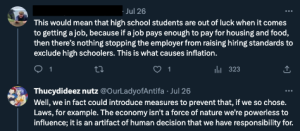But the Pharisees and lawyers rejected the counsel of God against themselves, being not baptized of John. And the Lord said, “Whereunto then shall I liken the men of this generation? and to what are they like? They are like unto children sitting in the marketplace, and calling one to another, and saying, We have piped unto you, and ye have not danced; we have mourned to you, and ye have not wept. For John the Baptist came neither eating bread nor drinking wine; and ye say, He hath a devil. The Son of man is come eating and drinking; and ye say, Behold a gluttonous man, and a winebibber, a friend of publicans and sinners!” —Luke 7.30-34
Kids Today
Fussy cranks everywhere will tell you that this country’s Catholic catechesis1 is terrible. For once, I agree with them. I join the fussy cranks in blaming many of the Church’s nation-scale ills on poor catechesis. I’ll even argue that it is, in part, responsible for the abuse crisis—albeit in a rather roundabout way. But before we get back to that, I want to talk about something much more important: Twitter.2
A few weeks ago, I tried an experiment. There’s this idea that tends to come up when Catholics discuss topics like divorce and homosexuality—namely, that people who don’t accept the teaching of the Church shouldn’t receive the Eucharist. I gave it one small tweak, and posted it.

In answer to your most pressing question, gentle reader, I had not yet thought up the display name
“Thucydideez nutz”; I was using the moniker “I will certainly not regret tweeting this” at the time.
For the record, I do in fact take this view, if—and only if—full weight is given to the word possible. (What’s pastorally appropriate to any individual is going to depend heavily on their circumstances; that’s kind of why we have pastors!) But I was feeling a little salty.3 So I decided to make it a thread, and rub that salt into any wounds I might cause:
![My further tweets: Actually, this represents something substantially beneath the Catholic view, which is that one person working a full-time job ought to be paid enough to support not only themselves but a spouse and children -- not a specified maximum number of children, just the number they have. But pastoral gradualism is sometimes necessary to guide people into the fullness of Catholic truth, so let's begin with the standard presented in the OP [original post, i.e. the quote tweet above].](https://wp-media.patheos.com/blogs/sites/1245/2023/08/Screen-Shot-2023-08-05-at-7.29.09-AM-300x147.png)
It’s hard to judge the parallels exactly. But as far as I can tell, this is a lot more generous to capitalists4 than similar statements about LGBT people from Catholics typically are. I didn’t speculate about the private lives of capitalists, or inform them of what their motives are. I didn’t suggest they either shape up or leave the Church. I recommended beginning with something less than the real demands of the Catholic faith, to facilitate a gradual progress. Since I don’t know their hearts or their circumstances, I was careful to say only that it’s possible capitalists should be refraining from Communion, rather than making any blanket statement. I didn’t even accuse them of being child molesters.
Now, I knew this would prompt rage (on the very minor scale of “people who read my tweets”!) if tweeted publicly. If all I’d wanted to do was make a joke, I could have sent it only to my circle. But I thought, and think, that a joke like this has some hope of reaching a few people as something more than a joke—perhaps of making them reflect on their own relationship with Catholic teaching, or the way they treat queer people, or both.
Of course, that reflection may only come weeks, or hours, or years later, if it comes at all. I suspected a lot of replies I would get would come from people who weren’t in that place yet.
Seek Not to Know for Whom the Notification Tolls
My suspicions were promptly vindicated. Here is a curated selection of the replies I got.

“Crazy talk” with a capital C, so you know he means business.

In further replies, this guy seemed really invested in making sure high schoolers were part of the work force
and not wasting all their time on “education” or “friends” on account of “literally still being minors.”

Food and housing for everyone; will horrors never cease. (Also
this is just not, in any way, what the word “communism” means.)

This one was kind of fun, just because “bazoongas” is a fun word. But
I was disappointed by the lack of creativity in most of the insults I received.
You’re Not My Real Mater et Magistra
I find this reply particularly significant. The theory it expresses is firmly condemned by the Church, and widely believed by American Catholics.

Yes, that is definitely the point of that parable. Moreover, if God is compared to something in a
parable, that thing must be good, which is why Christians welcome thieves in the night and unjust judges.
Now, this would make the very concept of just wages nonsensical. The whole point of having the idea is to have a standard to hold wages to, and thus a standard to hold wage-payers to. This definition makes “just wage” a useless synonym for “whatever wage actually gets paid.”
Moreover, despite the claims of our friend Crazy Talk up there, “just wages are a real thing” has been a standard assumption in Catholic theology for many centuries. This makes sense; the other spheres of social behavior don’t operate on Do as thou wilt shall be the whole of the law, so it’s not immediately clear why the economic sphere should. The notion that “just wage” simply means any wage an employee consents to take, even in economies with no general safety net, essentially means “It’s okay to take advantage of people as long as you’re doing it for money.”
It may not look like it’s saying that at first glance. But that’s because of what it’s leaving out: the conditions under which wages come to exist in the first place.
Paying the Piper
In the US, there is no general safety net. Retirees and people with severe disabilities normally receive support from the state, which may be enough to live on. Apart from that or being independently wealthy, if you’re an adult, you probably need a job to live. This in turn means most job applicants (and even most employees) have little to no power to negotiate their wages. Everything is at stake for them, whereas employers can usually manage just fine without this specific applicant or that specific employee. Nothing is likely to be at stake for them except inconvenience. Ergo, employers can offer a wage about as low as they want, while the proles can either take the wages that are actually available, or starve.5

Nevertheless, this capitalist outlook on economics is widely accepted by American Catholics. Many even among the devout vaguely suppose that, since the Church is against the Communist Party, she must be on the side of capitalism; after all, those are the two possible sides in the conflict, aren’t they? (No.) And many Catholics don’t even realize the Church has any doctrine on economics, let alone that she explicitly rejects certain key premises of capitalism—among them, the idea that consent alone is enough to make a wage or a price just. It’s not.
The Church does teach that consent is an element that contributes to justice. Once an agreement about wages or prices has been made, it’s typically fine to change it by mutual consent, but not by unilateral consent; doing that is called “theft.”6 But consent by itself is not enough to make an interaction right. It is a necessary condition, but not a sufficient condition. Justice is determined not only by what people can be persuaded to accept, but by human dignity—which is why “consensual slavery” is not okay. There are certain ways it’s simply not okay to treat a person. Not even if they’ve been so broken and blinded by living in the acrid smoke of the machine that they can’t imagine life outside of it.
All this is only one example of bad catechesis. But I think it’s an especially salient one …
“It’s Alright, We Told You What to Dream”
Now, if you haven’t heard “Welcome to the Machine” by Pink Floyd, I have three questions:
- how dare you,
- my father used to unwittingly terrify me with this song as a child, it’s excellent,7 and
- go listen to it right now.

This album, if you’re having any trouble. (Image provided for under fair use.)
Besides the “seven deadly sins,” there is another, simpler list of sources of temptation. It lists just three: the World, the Flesh, and the Devil. The Flesh means those temptations that come from within, and are mostly based on appetite: lust, gluttony, and sloth are its main expressions. The Devil represents uniquely spiritual temptations, which often means spiritualized versions of other temptations. Wrath and pride (especially “cold” pride, pride that “doesn’t need” others) are typical of the Devil, but its real center was put plainly by T. S. Eliot in Murder in the Cathedral: “The last temptation is the greatest treason, / To do the right deed for the wrong reason.” And the World?
One of the New Testament words for “world” is κόσμος [kosmos]. This is related to a verb meaning “to arrange, order, set in order; to adorn, beautify” (which is where we get the word cosmetics). The κόσμος is thus “the arrangement”—we might say, “the system”—and the temptations it represents, or worldliness, are the ones tied up in “being part of the system”: ambition, rivalry, conceit, corruption, spite. By the seven-deadlies classification, the World mainly means those sins rooted in avarice, envy, and that subspecies of pride we now call vanity. The baptismal service from the 1662 Book of Common Prayer invited the person to be baptized (or their godparents) to renounce “the pomps and vanity of this wicked world”.8
Why am I talking about this? One of the World’s standard tactics is that of the Machine from Pink Floyd. It tells you “what to dream,” what to value.

And I believe that is the sickness afflicting the Catholic Church in this country. Certainly it afflicts her in this era; in my view it’s been a primary shaper of her history for many centuries, maybe by her very nature as an institution. Her values, which is to say the values of most Catholics, have been warped by the World; I believe this is responsible for the wretched state of American catechesis, and more responsible than anything else for the abuse crisis.
If this sickness is not cured—as long as this warping is not corrected—to that same extent, it will continue. It’s not about gay men in the priesthood, it’s not about abolishing or not abolishing clerical celibacy, it’s not about the reverence of the Latin Mass or the sanctity of the seal of Confession. I believe that it does not matter what canons and policies any bishops’ conferences institute, what prelates and popes are consecrated, what grand juries or tabloids or even whistleblowers report. Until and unless the Machine is ripped bodily out of the Church, I believe we are going to get exactly the same results, generation after generation.
To be continued …
Footnotes
1Catechesis means instruction in the teachings of the faith. It’s also called catechism, though this word more usually means the material taught and/or the book summarizing that material; catechesis refers only to the act or process of teaching.
2No, I’m not going to call it “X.” This is partly out of sheer contempt for Smell; partly too because it’s one of the least-helpful names anyone has ever come up with for a thing (unlike, for example, “Twitter,” an instantly distinctive word which is also easy to say and spell—quite a brilliant coinage, really). But above all, it’s such a porn-sounding name. If I’m going to do something as disgraceful as using Twitter, I feel I ought to publicly bear the consequences and call it by its name, not hide behind a name like “X” that makes it sound like I’m merely watching porn like a respectable pervert.
3Twenty-five years of being told that you are what is wrong with America can have this effect.
4The position I was rebuking here—i.e., that whether a person works full-time should have no bearing on whether they can house and feed themselves—isn’t really identical with capitalism, so using the word here is arguably a little unfair. Unfortunately, I don’t have an alternative word for it; fortunately, only capitalists normally hold it, and most capitalists do subscribe to it.
5There are three important exceptions to this. First, union workers have the power of collective bargaining, and the Church does insist workers have a moral right to unionize (i.e., it remains a right whether the state recognizes it by law or not). Second, while most workers don’t fall into this category, workers who have highly specialized skills or expertise may have some bargaining power as well, since they can be harder to replace; however, this depends on a lot of other factors. And thirdly, the Small Business Owners whom the Right loves to hide behind (like a Great Dane “hiding” behind a two-year-old child) do exist. If we dealt with them exactly the same way Catholicism and/or the Left wants to deal with international corporations headed by billionaires, with no intelligent adaptation of the underlying principles whatsoever—then yes, that probably would be bad. However, one of the lovely things about human behavior is that when applying a principle stupidly would be stupid, we can simply not. We can even look into applying it in a smart way.
6When we’re talking about theft from a seller by a buyer, we usually say “theft” or a synonym (e.g. “shoplifting” for petty goods). When it’s theft from a buyer by a seller, it’s often “fraud” or a “breach of contract.” I’m not sure English has a word (besides “bad work”) that generally covers theft from an employer by employees; and when it is employers who are stealing from employees, it’s generally called “wage theft.”
7Seriously—I’m not saying a word against The Wall or Dark Side of the Moon, but Wish You Were Here is in my opinion Pink Floyd’s best album (and, indisputably, underrated).
8Note that vanity here does not have the meaning just mentioned (the word vainglory would represent that idea in the seventeenth century). Rather, it means “emptiness, hollow show, worthlessness”; the fossilized phrase “in vain” preserves this meaning. Given the World’s pretense to offer power, security, good repute, and the like, calling its gifts a hollow show is really an even more severe insult than calling them conceited.















